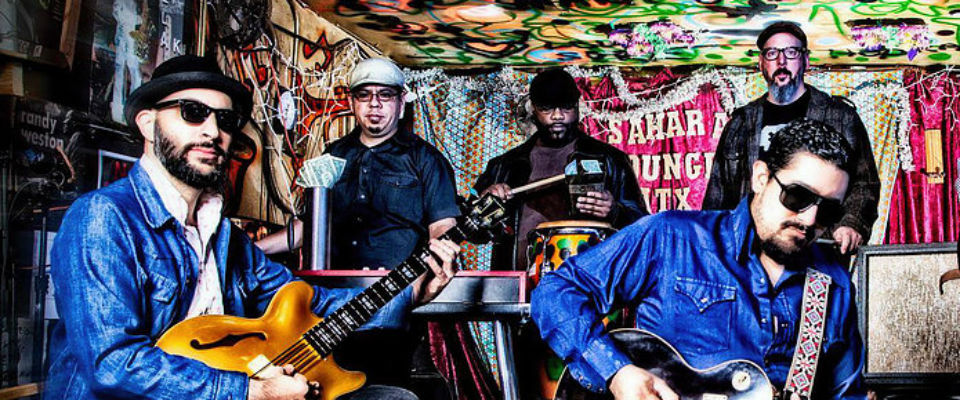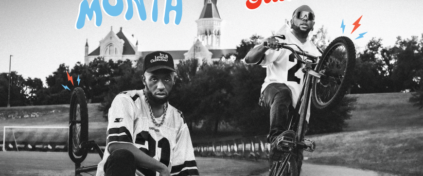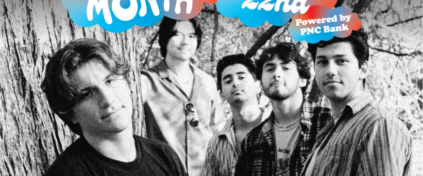by Jeff McCord
It was a great plan. The Austin outfit Money Chicha, a more nimble offshoot of Grupo Fantasma, plays the Amazonian psychedelic rock Cumbia known as Chicha. They had already brought in Peruvian Chicha superstar Jose Carballo (guitarist of La Nueva Crema) for a couple of short sessions and workshops they captured on tape. And they also had started work on their own second full-length album, after years of single releases, recording at Sonic Ranch Studios in West Texas.
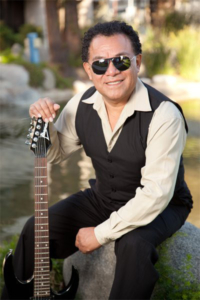
Bassist Greg Gonzales explains the original idea. “So we put out this album with [Carballo] and hopefully through the association with him and kind of the story of us linking up with this legendary musician, we can kind of Buena Vista Social Club it, so to speak. You know, maybe get some good cultural events, some festivals, whatever, on the basis of this amazing story. Since those things book so far out, we’ll make our own album as well. And then when we’re on tour, we can also sell our own album and we could route in between these big anchor dates doing our own shows without him. He’s an old man. I mean that in the best sense, he’s in great health. But he doesn’t have any interest in riding in this stinky van with five dudes. We would route between these events and he could just fly in and hit us there, and all the routes in between would be the Money Chicha events, and we would have two albums to sell. It’s kind of the grand scheme. But you know what they say, man plans and God laughs.”
COVID derailed it all, of course, and left the band with two unfinished albums. So they combined them. When I mention to Gonzalez how cohesive they sound, he laughs out loud.
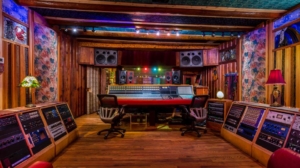
“It just struck me one day. If this is on vinyl, you’re going to have an A-side and a B-side, right? They can sound totally different. It might be more noticeable on a digital download, but we also did some tricks to try and even it out. And one of the funniest things about it all is, you know, Sonic Ranch is this amazing, beautiful place to make a record. We recorded it to this Neve console that used to live at Motown in Los Angeles. We recorded on this pristine, two-million-dollar board using all this fancy gear. And meanwhile, the stuff we recorded with Jose Carballo was at Lechehouse Music in Buda [the studio of guitarist Beto Martinez], recorded to a Tascam 388 reel to reel. So what we ended up doing is, we took all the tracks from Sonic Ranch and bounced them all down to eight tracks and then mixed [both sessions] on the same reel to reel. That’s how we tried to match it. We also ended up doing a lot of overdubs to add a cohesive sound as well. A big part of that was [Colombian percussionist] Victor Cruz from Nemegata. We got him to lay down all the kind of hand percussion and little drum elements, and that really helped tie it all together.”
Joining Carballo and Cruz in the all-star lineup is Colombian American vocalist Kiko Villamizar. And the band has assembled some mash-up videos, with Carballo filmed separately, to help promote the release. The result, Chicha Summit, is an exuberant joy to hear, a non-stop rhythmic propellant with explosive guitar bursts, that sounds like it was just as much fun to play. Gonzalez concurs.
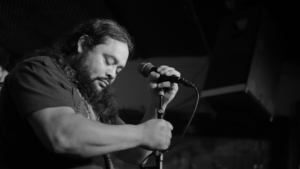
“Absolutely. It’s been really a good time having this band. And it kind of pushed us all to redefine the borders of what we were able to do. Playing Cumbia music with Grupo Fantasma has always been a blast. But, when you have that many people in a band, everyone has a more defined role. There’s not as much room to improvise. So it’s been really liberating, but it’s also allowed us to push the boundaries of what we thought Cumbia music could be. Our drummer, John Speice, gets to do kind of a hybrid situation where he does like cymbals and drums that combine to make his own unique drum situation. Kind of the same with our conga player, Lou [‘Sweet Lou’ Holmes]. He’s doing bongos and congas at the same time.”
I bring up to Gonzalez the in-joke of Money Chicha‘s name: being freed from the huge lineup of Grupo Fantasma, the players might actually end up with some cash in their pockets at the night’s end.
He laughs. “It’s more of the infrastructure that’s required. Grupo Fantasma and Brownout, with that many people, require so many monitors and microphones and sound systems and, you know – money. Money Chicha just started out playing at the Continental Gallery, which is basically three microphones that we put on ourselves and then started going cutting loose, you know? That allows us to play more community gigs of benefits or things or smaller events that don’t have the budget for the bands. I mean, it also the money is not split as many ways, but it’s not like any of us is getting rich playing music.”
Armed with a great new album, will Money Chicha be hitting the road in these uncertain times?
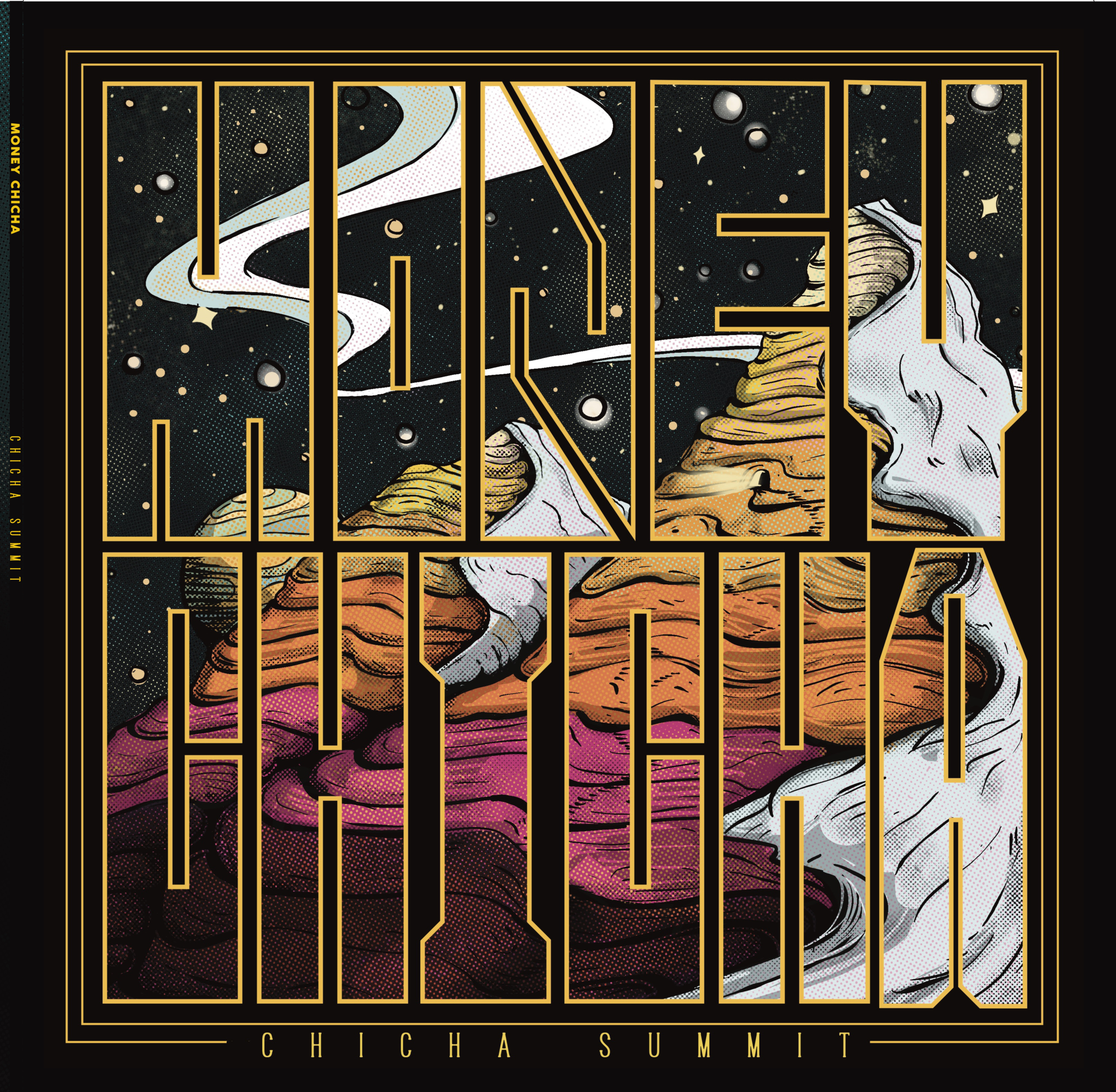
“At this point, we’re playing a ton regionally with our bands, and we don’t have any plans to tour unless flyouts present themselves. If we end up doing tours, it would probably not be until next summer at the earliest. There are too many unknowns to take that kind of risk. Even the people I do know who are in big bands like Gary Clark and Black Pumas, our colleagues in the Austin scene, they’re taking all kinds of precautions, whether it’s flying on private planes or traveling in a bubble where they can’t interact with other people and having nurses on call. Smaller-level bands who are doing band tours are doing daily tests, and if someone gets sick, the whole tour is canceled. We just can’t afford to do that. On top of that, during COVID, everybody had to pivot a little bit and start doing some other stuff. So Beto is producing and mixing and recording a ton of stuff at his studio right now. And I decided to finish my graduate degree. So I’m actually at UT right now, halfway through that.”
Everywhere, not only in the music business, pivots have become a part of pandemic life. In the meantime, Money Chicha is releasing Chicha Summit on October 15th, and we can all celebrate with them in person. Their next show is on October 8th at the Far Out Lounge.
